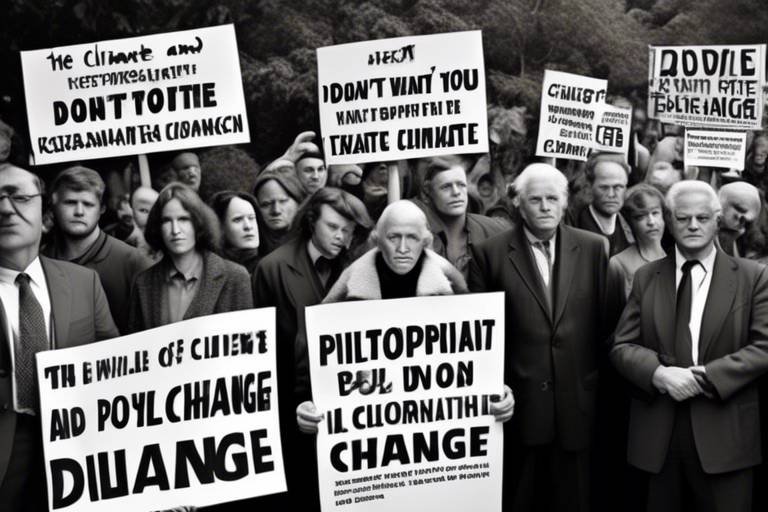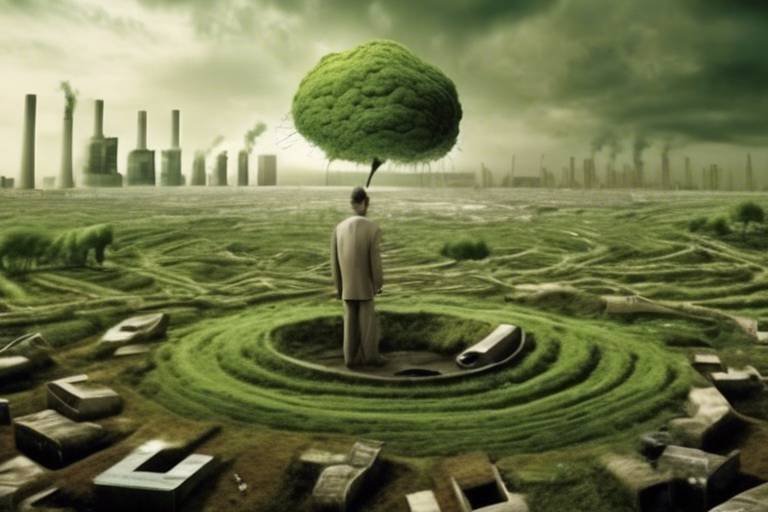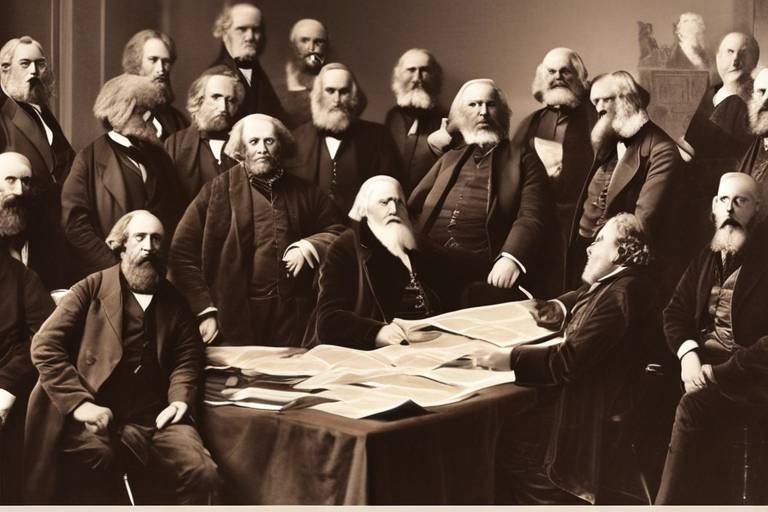The Philosophy and Politics of Climate Change Denial
Climate change denial is not just a fringe belief; it is a phenomenon deeply rooted in philosophical ideologies and political motivations. Understanding this denial requires peeling back layers of complex thought processes and societal influences. At its core, climate change denial can be seen as a reflection of our values, beliefs, and fears. For many, acknowledging climate change may feel like admitting to a loss of control or power over our environment. It can be daunting to accept that human actions have contributed to such a monumental crisis. This emotional response often leads individuals to reject scientific evidence, opting instead for comforting narratives that align with their pre-existing beliefs.
Moreover, political affiliations play a significant role in shaping attitudes toward climate change. For instance, individuals who identify with certain political parties may be more likely to dismiss climate science due to the party's stance on environmental issues. This creates a polarized environment where rational discourse is overshadowed by ideological warfare. The stakes are high; climate change denial can lead to a lack of action on crucial policies, which exacerbates the environmental crisis we face today.
In addition, the philosophical underpinnings of denial often intersect with economic interests. Many industries, particularly fossil fuels, have a vested interest in maintaining the status quo. By promoting doubt around climate change, they safeguard their profits and influence over public policy. This creates a vicious cycle where economic concerns and political power intertwine, leading to a widespread rejection of the scientific consensus.
As we delve deeper into the intricacies of climate change denial, it becomes evident that combating this issue requires more than just presenting facts. It necessitates a comprehensive understanding of the psychological, social, and economic factors at play. To effectively address climate change, we must engage in open dialogues that challenge these deeply held beliefs while fostering a sense of community and shared responsibility. Only then can we hope to bridge the divide and work towards sustainable solutions that benefit both the planet and its inhabitants.
- What is climate change denial? - Climate change denial refers to the rejection of the scientific consensus on climate change, often driven by ideological beliefs and misinformation.
- Why do people deny climate change? - Denial can stem from emotional responses, political affiliations, economic interests, and a general distrust of scientific authority.
- How does misinformation spread? - Misinformation proliferates through various media platforms, including social media, where echo chambers reinforce false narratives.
- What can be done to counter climate change denial? - Combating denial requires education, transparent communication, and engaging communities in constructive dialogue about climate science.

The Roots of Climate Change Denial
Understanding the roots of climate change denial is like peeling back the layers of an onion—each layer reveals a complex interplay of beliefs, values, and misinformation that shape public discourse on environmental issues. At its core, climate change denial is not just a rejection of scientific evidence; it’s deeply intertwined with historical, ideological, and cultural factors. Many individuals and groups reject climate science because it conflicts with their worldviews, economic interests, or political affiliations. This denial can often be traced back to a few key origins:
- Historical Context: The modern environmental movement arose in the 1960s and 1970s, coinciding with significant social changes. This era saw the rise of skepticism towards established authorities, including governments and scientists. Consequently, many people began to question the validity of scientific consensus on climate change.
- Ideological Beliefs: For some, climate change is seen as a threat to capitalism and individual freedoms. The idea that human activity could necessitate government intervention is a bitter pill to swallow for those who prioritize minimal government oversight. This ideological clash fuels denial, as accepting climate change implies a need for collective action that many find uncomfortable.
- Economic Interests: Industries reliant on fossil fuels have a vested interest in denying climate change. Lobbying efforts and funding of misinformation campaigns are strategies employed to protect profits, creating a narrative that questions the validity of climate science.
Moreover, the spread of misinformation has played a crucial role in shaping public perception. Misleading information often masquerades as legitimate debate, creating a false sense of uncertainty around climate science. This is particularly evident in media portrayals, where sensationalism can distort facts and promote skepticism. The result is a public that is confused and divided, unsure of whom to trust.
Another significant factor is the influence of social identity. People often align their beliefs about climate change with those of their social groups. This phenomenon creates echo chambers, where dissenting opinions are not only unwelcome but actively suppressed. When individuals see their peers dismissing climate change, they are likely to adopt similar views, reinforcing a cycle of denial.
In summary, the roots of climate change denial are deep and multifaceted. They encompass historical skepticism, ideological beliefs, economic motivations, and social identity. Understanding these roots is crucial for addressing the denial that hampers effective climate action. By recognizing the underlying factors that contribute to this phenomenon, we can begin to foster a more informed public discourse that embraces scientific consensus and encourages proactive measures against climate change.

The Role of Misinformation
Misinformation is like a weed in the garden of truth; it spreads rapidly and chokes out the healthy plants of knowledge and understanding. In the context of climate change, misinformation has become a formidable adversary, undermining the scientific consensus and creating a fog of confusion among the public. The rise of digital media has only exacerbated this issue, allowing false narratives to proliferate at an unprecedented rate. With every tweet, post, and article that misrepresents climate science, the public's grasp on the reality of our environmental crisis weakens.
One of the most insidious aspects of misinformation is its ability to distort facts and create a false sense of debate where none should exist. For instance, when a handful of scientists question climate change, their voices are often amplified by media outlets, leading the public to believe that there is significant disagreement among experts. In reality, over 97% of climate scientists agree that climate change is real and primarily caused by human activity. This overwhelming consensus is often overshadowed by the loud minority, creating a misleading narrative that fuels skepticism.
The media plays a crucial role in shaping public perception of climate change. Unfortunately, sensationalism often takes precedence over factual reporting. When headlines scream about extreme weather events or climate disasters, they can inadvertently lead to desensitization. People may become overwhelmed and tune out the urgent calls for action, thinking, “What can I do about it anyway?” This cycle of fear and apathy is a breeding ground for misinformation, as it allows denialist rhetoric to take root.
Social media platforms have created echo chambers where misinformation thrives. In these digital spaces, individuals are often surrounded by like-minded peers who reinforce their beliefs, regardless of the factual accuracy. This phenomenon can be likened to a digital bonfire, where misinformation is tossed in and everyone gathers around to share in the warmth of their shared beliefs, while the truth remains outside, cold and ignored. The algorithms that govern these platforms often exacerbate the problem, promoting content that generates engagement, regardless of its truthfulness.
To combat the tide of misinformation, fact-checking and accountability are essential. Organizations dedicated to fact-checking climate-related claims serve as crucial watchdogs in the media landscape. By scrutinizing statements made by public figures and media outlets, these organizations help to clarify the facts and hold those spreading misinformation accountable. However, the challenge remains: how do we get this information into the hands of those who need it most? Educating the public about the importance of verifying information before sharing it can empower individuals to become more discerning consumers of news.
In conclusion, the role of misinformation in climate change denial cannot be overstated. It distorts reality, shapes public perception, and creates barriers to effective policy-making. To pave the way for a more informed society, we must confront misinformation head-on, armed with facts and a commitment to transparent communication. Only then can we hope to foster a collective understanding of the urgent need for climate action.
- What is climate change denial? Climate change denial refers to the refusal to accept the scientific consensus on climate change, often fueled by misinformation and political motivations.
- How does misinformation spread? Misinformation spreads through various media platforms, particularly social media, where false narratives can be quickly shared and amplified.
- What can be done to combat misinformation? Combating misinformation requires education, fact-checking, and encouraging open dialogue within communities to promote understanding and awareness.
- Why is public perception important in climate change? Public perception shapes policy-making and collective action; if the public is misinformed, it can hinder effective responses to climate change.

Media Influence on Public Perception
The media plays a pivotal role in shaping public perception of climate change, acting as a double-edged sword that can either inform or mislead. In today's fast-paced digital landscape, where information is consumed at lightning speed, the responsibility of media outlets is greater than ever. Unfortunately, sensationalism often takes precedence over accuracy, leading to a distorted view of climate science. Have you ever noticed how some news headlines seem to exaggerate the reality? This trend not only confuses the audience but also fosters skepticism about the scientific consensus on climate change.
Consider this: when the media presents climate change as a controversial topic, it inadvertently gives credence to the denialist narrative. Instead of emphasizing the overwhelming agreement among climate scientists, articles might highlight fringe opinions, creating a false sense of debate. This phenomenon is known as "false balance," where equal weight is given to both sides of an argument, regardless of the evidence. For example, a report might feature one climate scientist advocating for urgent action alongside a climate change skeptic, suggesting that both perspectives are equally valid. This approach can mislead the public into thinking that there is significant disagreement within the scientific community.
Moreover, the rapid spread of misinformation through social media platforms has exacerbated the issue. With algorithms prioritizing engagement over truth, sensationalist content often goes viral, drowning out factual information. People are more likely to share shocking headlines than nuanced articles, leading to an echo chamber effect where misinformation is amplified. As a result, individuals may find themselves trapped in a bubble of like-minded opinions, further entrenching their beliefs about climate change.
To illustrate the impact of media influence, consider the following table that highlights key differences in coverage between mainstream media and social media platforms:
| Aspect | Mainstream Media | Social Media |
|---|---|---|
| Fact-Checking | Usually employs fact-checkers | Varies widely; often unchecked |
| Source Credibility | Typically relies on expert sources | Can include unverified or anonymous sources |
| Content Type | In-depth analysis and reporting | Short, sensational posts and memes |
| Engagement | Encourages thoughtful discussion | Often polarizing and divisive |
As we navigate this complex media landscape, it becomes clear that combating climate change denial requires not only critical thinking from the public but also accountability from media outlets. Journalists and editors must prioritize accuracy over sensationalism, ensuring that their reporting reflects the scientific consensus. In doing so, they can help foster a more informed public discourse that recognizes the urgency of climate action.
- How can I identify credible news sources on climate change? Look for established media outlets that employ professional journalists and fact-checkers. Peer-reviewed scientific journals are also excellent sources of reliable information.
- What can I do to combat misinformation? Share credible information from trusted sources, engage in discussions with others, and promote media literacy within your community.
- Why is it important to address media influence on climate change? Addressing media influence is crucial for ensuring that the public has an accurate understanding of climate science, which is essential for effective policy-making and action.

Social Media and Echo Chambers
In today's digital age, social media platforms have become the battleground for ideas, opinions, and, unfortunately, misinformation. These platforms can be likened to vast amphitheaters where users gather to share their beliefs and perspectives. However, what often happens is that these online spaces transform into echo chambers. In these echo chambers, individuals are surrounded by like-minded people who reinforce their existing beliefs, creating a feedback loop that amplifies climate change denial.
Imagine shouting into a canyon and only hearing your own voice bounce back at you. This is similar to how echo chambers function. When users engage with content that aligns with their views, algorithms curate more of the same, leading to a narrow perspective. As a result, misinformation about climate change can spread rapidly without being challenged. A study by the Pew Research Center found that social media users are more likely to encounter information that confirms their pre-existing beliefs rather than content that challenges them. This phenomenon not only perpetuates denial but also contributes to a wider distrust in scientific consensus.
Moreover, social media platforms often prioritize sensationalism over accuracy, further complicating the issue. A post that claims climate change is a hoax might garner far more attention and engagement than a scientifically backed article explaining the realities of climate science. This skewed engagement can mislead users into thinking that denialist views are more widely accepted than they truly are. It's essential to recognize that while social media can be a powerful tool for awareness and education, it can also serve as a double-edged sword, cutting through the fabric of informed discourse.
To combat the spread of misinformation in these echo chambers, several strategies can be employed:
- Critical Thinking Skills: Encouraging users to question the information they encounter and seek out diverse viewpoints can help break the cycle of misinformation.
- Promoting Diverse Content: Social media platforms can adjust their algorithms to promote a wider range of perspectives, rather than just those that align with users' preferences.
- Community Engagement: Initiatives that foster dialogue between different viewpoints can help bridge divides and promote understanding.
Ultimately, addressing the challenges posed by social media echo chambers requires a concerted effort from both individuals and platform providers. By fostering an environment that values accurate information and diverse perspectives, we can work towards a more informed public discourse on climate change, paving the way for effective action and policy-making.
- What is an echo chamber? An echo chamber is a situation where beliefs are amplified and reinforced by communication and repetition within a closed system, leading to a lack of exposure to differing viewpoints.
- How does social media contribute to climate change denial? Social media can amplify misinformation and create echo chambers where users are only exposed to views that confirm their beliefs, making it harder for accurate information to penetrate.
- What can be done to combat misinformation on social media? Encouraging critical thinking, promoting diverse content, and fostering community engagement are essential strategies to combat misinformation.

Fact-Checking and Accountability
In today's digital age, where information spreads like wildfire, the importance of fact-checking and accountability cannot be overstated. With climate change denial gaining traction, it becomes crucial to ensure that the public is equipped with accurate information. The role of fact-checkers is essential; they act as the guardians of truth, sifting through the noise to highlight reliable scientific data. This process not only enhances public understanding but also fosters trust in the scientific community.
Moreover, accountability in media reporting is vital. When news outlets disseminate misleading information about climate science, they contribute to a culture of skepticism and confusion. It is imperative that these outlets are held responsible for their narratives. For instance, a recent study highlighted that over 60% of climate change-related articles contained inaccuracies that could mislead readers. Such statistics underline the necessity for rigorous editorial standards and a commitment to factual reporting.
To facilitate this, various organizations and initiatives have emerged dedicated to fact-checking climate claims. These groups not only debunk false narratives but also provide context and clarity. For example, the Climate Reality Project and FactCheck.org have developed extensive resources that equip individuals with the tools to discern fact from fiction. By utilizing these resources, the public can engage in informed discussions about climate change, which is essential for fostering a proactive approach to environmental issues.
Furthermore, the rise of social media has amplified the need for accountability. With platforms like Twitter and Facebook serving as primary information sources for many, the potential for misinformation is significant. Thus, social media companies must implement strict policies to counteract the spread of false information. This could include flagging misleading posts or promoting content that is verified by scientific experts. By doing so, they can play a pivotal role in shaping a more informed public discourse.
In conclusion, fact-checking and accountability are not just buzzwords; they are essential components in the fight against climate change denial. By prioritizing accurate information and holding media accountable, we can cultivate a society that values science and understands the urgent need for action against climate change. As we move forward, it is crucial for individuals, organizations, and media outlets to work collaboratively in promoting a culture of truth and transparency.
- What is fact-checking? Fact-checking is the process of verifying the accuracy of information, particularly claims made in public discourse.
- Why is accountability important in media? Accountability ensures that media outlets provide accurate information, which is crucial for public trust and informed decision-making.
- How can I verify climate change information? You can verify information by consulting reputable sources such as scientific journals, government reports, and established fact-checking organizations.
- What role does social media play in climate change denial? Social media can spread misinformation quickly, creating echo chambers that reinforce denialist beliefs. It’s important to critically evaluate the information shared on these platforms.

Political Motivations Behind Denial
When we delve into the murky waters of climate change denial, we quickly realize that it’s not just a matter of science versus belief; it’s also deeply intertwined with political interests and affiliations. Many individuals and groups deny the existence of climate change not out of ignorance, but rather to protect their economic interests or to maintain their grip on political power. This creates a fascinating, albeit troubling, landscape where facts are often overshadowed by the motives of those in power.
Take, for instance, certain industries that thrive on fossil fuels. The oil, gas, and coal sectors have a vested interest in downplaying the urgency of climate change. By promoting denial, they can continue their operations without the burden of regulatory changes that would require them to invest in cleaner technologies. It’s a classic case of self-preservation, where short-term gains are prioritized over long-term sustainability. In this context, the denial of climate science serves as a convenient shield against the economic repercussions of transitioning to a greener economy.
Moreover, we must consider the role of political parties and their platforms. In some countries, particularly where climate change has become a polarizing issue, political leaders may choose to deny or downplay climate change to align with their base. This is especially prevalent in regions where voters may prioritize job security in traditional industries over environmental concerns. For these politicians, the stakes are high: support from constituents can often outweigh the scientific consensus on climate change. Thus, they craft narratives that resonate with their audience, even if those narratives are steeped in misinformation.
In addition to economic and electoral motivations, ideology plays a crucial role in climate change denial. Some individuals subscribe to a worldview that prioritizes individualism and free-market principles, viewing environmental regulations as an infringement on personal liberties. This ideological stance can lead to a rejection of climate science, as accepting it would mean embracing government intervention and regulation—something that runs counter to their beliefs. This ideological battle can be likened to a tug-of-war, where each side is pulling in opposite directions, often leaving the truth in the dust.
Interestingly, the intersection of misinformation and political motivation creates a feedback loop. As denialist rhetoric gains traction, it can influence public opinion, which in turn affects policy decisions. This creates an environment where scientific evidence is often dismissed, and the voices of climate scientists are drowned out by the louder, more sensational claims of denialists. To illustrate this dynamic, consider the following table:
| Political Motivation | Impact on Climate Change Denial |
|---|---|
| Economic Interests | Protection of fossil fuel industries and resistance to regulatory changes. |
| Electoral Strategy | Aligning with voter beliefs to secure political power and support. |
| Ideological Beliefs | Rejection of government intervention and prioritization of free-market principles. |
Ultimately, the political motivations behind climate change denial create a complex web that complicates the path to effective climate action. It’s essential to understand these motivations not just to combat denialism, but to foster constructive dialogue that can bridge the divide between differing beliefs and promote a collective approach to tackling one of the most pressing issues of our time.
- What are the main reasons behind climate change denial? Political interests, economic motivations, and ideological beliefs play significant roles in climate change denial.
- How does misinformation contribute to climate change denial? Misinformation spreads false narratives that undermine scientific consensus, leading to public confusion and skepticism.
- What can be done to counter climate change denial? Education, transparent communication, and community engagement are essential strategies to combat denialism.

The Impact on Policy and Action
The phenomenon of climate change denial has profound implications for policy-making and global action against climate change. When significant portions of the population reject the overwhelming scientific consensus on climate change, it creates a ripple effect that can hinder legislative efforts aimed at addressing environmental issues. Imagine trying to steer a ship through a storm without a compass; that’s what policymakers face when public opinion is swayed by denialist rhetoric. The challenge lies not only in the scientific facts but also in the emotional and ideological beliefs that drive public sentiment.
One of the most pressing issues is the legislative challenges that arise from this denial. Policymakers often find themselves caught between the hard evidence presented by scientists and the vocal opposition from constituents who may be influenced by misinformation. This divide complicates the creation of effective climate policies. For instance, a recent study indicated that in regions where climate skepticism is prevalent, lawmakers are less likely to support renewable energy initiatives or carbon reduction strategies. As a result, vital legislation that could mitigate climate change is either stalled or diluted, leaving communities vulnerable to the impacts of a warming planet.
Furthermore, the impact of climate change denial extends to international cooperation and agreements. When countries are divided on the reality of climate change, it complicates negotiations on a global scale. The Paris Agreement, a landmark accord aimed at limiting global warming, relies on collective action and commitment from all nations. However, if key players deny the urgency of climate action, it creates a significant barrier to achieving meaningful international cooperation. The table below illustrates how denial can hinder global agreements:
| Country | Climate Change Stance | Impact on International Agreements |
|---|---|---|
| Country A | Denies climate change | Refuses to commit to emission reductions |
| Country B | Accepts climate change | Advocates for stronger global policies |
| Country C | Mixed stance | Struggles to align with global initiatives |
This table highlights how differing beliefs about climate science can lead to significant challenges in forming a united front against climate change. The lack of consensus not only stifles progress but also fosters an environment where misinformation can thrive, making it even more difficult to enact effective policies.
In essence, the impact of climate change denial on policy and action is multifaceted and deeply concerning. As we navigate these turbulent waters, it is crucial for advocates, scientists, and informed citizens to work together to bridge the gap between scientific understanding and public perception. By fostering transparent dialogue and education, we can create a more informed populace that demands effective action against climate change.
- What is climate change denial? Climate change denial refers to the rejection or dismissal of the scientific consensus on climate change, often fueled by misinformation and ideological beliefs.
- How does climate change denial affect policy-making? It creates significant challenges for policymakers, as they must navigate public opinion that may be influenced by denialist rhetoric, often leading to stalled or ineffective legislation.
- What role does misinformation play in climate change denial? Misinformation spreads false narratives that undermine scientific consensus, making it difficult for the public to grasp the urgency and reality of climate change.
- How can we combat climate change denial? Combating denial requires a multifaceted approach, including education, transparent communication, and fostering community dialogue to promote understanding of climate science.

Legislative Challenges
The landscape of climate change policy is fraught with that stem from a complex interplay of public opinion, political agendas, and the pervasive influence of climate change denial. As lawmakers attempt to craft effective policies aimed at mitigating climate change, they often find themselves caught between the scientific consensus on climate issues and the skepticism propagated by denialist rhetoric. This divide can lead to significant hurdles in advancing meaningful legislation.
One of the primary challenges is the polarization of climate change as a political issue. In many regions, climate change has become synonymous with partisan politics, where support for environmental policies is often seen as a reflection of one's political affiliation. For instance, in the United States, the debate surrounding climate change is heavily influenced by party lines, with some political factions vehemently opposing climate action due to fears of economic repercussions or loss of jobs in traditional industries. This creates a scenario where scientific evidence is often overshadowed by political maneuvering.
Moreover, the legislative process itself can be slow and cumbersome. When climate change is at the forefront of political discussions, policymakers may face immense pressure from various interest groups, including fossil fuel industries, that lobby against stringent regulations. These groups often argue that aggressive climate policies could lead to job losses and economic downturns, further complicating the ability to pass comprehensive climate legislation. The result is a tug-of-war between the need for urgent action and the desire for economic stability.
Additionally, the lack of public understanding and awareness regarding the urgency of climate action can further exacerbate legislative challenges. Many constituents may not fully grasp the implications of climate change or the need for immediate policy responses. This gap in understanding can lead to a disconnection between what scientists advocate and what the public perceives as necessary action. Consequently, lawmakers may hesitate to support bold climate initiatives for fear of backlash from their constituents.
To illustrate the impact of climate change denial on legislation, consider the following table that outlines key legislative challenges:
| Challenge | Description |
|---|---|
| Political Polarization | Climate change viewed through a partisan lens, affecting bipartisan support for legislation. |
| Lobbying by Interest Groups | Fossil fuel and other industries lobbying against climate policies, arguing economic risks. |
| Lack of Public Awareness | Insufficient understanding of climate issues among constituents, leading to hesitance in policy support. |
| Slow Legislative Process | Time-consuming procedures hinder the swift enactment of necessary climate legislation. |
Ultimately, overcoming these legislative challenges requires not only a commitment to science-based policy-making but also a concerted effort to engage the public in meaningful conversations about climate change. By fostering a better understanding of the issues at hand, lawmakers can help bridge the gap between scientific evidence and public perception, paving the way for more robust and effective climate legislation.
- What are the main causes of climate change denial? Climate change denial often stems from misinformation, political ideologies, and economic interests that conflict with scientific consensus.
- How does climate change denial affect policy-making? Denial can create significant barriers to enacting effective climate policies, as public opinion may sway lawmakers away from necessary action.
- What role does education play in combating climate change denial? Education is crucial in raising awareness and understanding of climate science, helping to dispel myths and misinformation.
- Can public dialogue help in addressing climate change? Yes, fostering open discussions within communities can lead to a better understanding of climate issues and encourage collective action.

International Cooperation and Agreements
When it comes to tackling climate change, international cooperation is not just beneficial; it’s absolutely essential. The world operates like a vast interconnected web, where the actions of one nation can ripple through the entire globe. Climate change knows no borders, and neither should our efforts to combat it. However, the reality is that climate change denial complicates these efforts, creating a maze of challenges that can hinder meaningful agreements and collaborations.
Take, for instance, the Paris Agreement, a landmark accord that aims to unite countries in the fight against climate change. This agreement is built on the premise that nations will voluntarily commit to reducing greenhouse gas emissions. But when some countries deny the reality of climate change, they may be less inclined to uphold their commitments or even participate in negotiations. This denial creates a disconnect between scientific consensus and political action, leading to a fragmented approach to what should be a unified global effort.
Moreover, differing beliefs about the severity and causes of climate change can lead to contentious negotiations. For example, countries heavily reliant on fossil fuels may resist transitioning to renewable energy sources, fearing economic repercussions. This creates a situation where nations are at odds, prioritizing short-term economic gains over long-term sustainability. The result? A stalemate that stalls progress and diminishes the urgency needed to address this pressing issue.
In addition, the presence of climate change denial can undermine public trust in international agreements. When leaders publicly question the science behind climate change, it sends a confusing message to their constituents. Citizens may then feel disillusioned, believing that if their leaders don’t take climate change seriously, why should they? This skepticism can further weaken the resolve needed for nations to come together and take decisive action.
To illustrate the impact of international cooperation on climate change, consider the following table:
| International Agreement | Year Established | Key Objective |
|---|---|---|
| Kyoto Protocol | 1997 | Reduce greenhouse gas emissions |
| Paris Agreement | 2015 | Limit global warming to below 2°C |
| Glasgow Climate Pact | 2021 | Accelerate action towards the goals of the Paris Agreement |
This table highlights just a few of the major international agreements that have emerged to combat climate change. Each of these agreements represents a collective understanding of the need for action, yet their effectiveness can be severely undermined by climate change denial. As countries navigate these complex waters, it becomes increasingly clear that collaboration is key. Only by working together can nations hope to create a sustainable future for generations to come.
In conclusion, international cooperation in addressing climate change is fraught with challenges, particularly due to climate change denial. To overcome these obstacles, a concerted effort is needed to foster understanding and commitment among nations. By promoting transparency, encouraging dialogue, and prioritizing science-based policies, we can pave the way for effective international agreements that truly address the climate crisis.
- What is climate change denial? Climate change denial refers to the rejection or dismissal of the scientific consensus that climate change is occurring and is primarily caused by human activities.
- Why is international cooperation important for climate change? Climate change is a global issue that transcends national borders. International cooperation is essential to implement effective strategies and agreements that can mitigate its impacts.
- How do international agreements address climate change? International agreements set targets for emissions reductions, promote renewable energy, and encourage countries to work together towards common climate goals.
- What are some examples of international agreements on climate change? Notable examples include the Kyoto Protocol, the Paris Agreement, and the Glasgow Climate Pact, each aiming to unite nations in the fight against climate change.

Countering Climate Change Denial
Addressing climate change denial is not just a matter of presenting facts; it requires a multifaceted approach that engages individuals on various levels. Education is the cornerstone of this effort. By enhancing public understanding of climate science, we can dismantle the misconceptions that fuel denial. Awareness campaigns, whether through social media, community workshops, or school programs, can play a pivotal role in bridging the knowledge gap. Imagine a world where everyone is equipped with the tools to discern fact from fiction—this is the future we need to strive for.
Transparent communication is equally vital. Scientists and environmental advocates must work together to present their findings in a way that is both accessible and engaging. This means using relatable language, avoiding jargon, and employing visual aids like infographics or videos to illustrate complex concepts. For instance, a simple infographic showing the correlation between carbon emissions and rising global temperatures can be more impactful than a lengthy report filled with technical data. The goal is to make the science of climate change resonate with individuals on a personal level, sparking a sense of urgency and responsibility.
Furthermore, fostering public engagement with science and environmental issues is crucial. This can be achieved through community forums, town hall meetings, and online discussions where individuals can voice their concerns and ask questions. Engaging communities in dialogue encourages a more nuanced understanding of climate change, allowing for the dispelling of myths and the promotion of collective action. When people feel heard and involved, they are more likely to embrace the reality of climate change and support efforts to combat it.
To illustrate the impact of community engagement, consider the following table that highlights successful initiatives across different regions:
| Region | Initiative | Outcome |
|---|---|---|
| California | Community Climate Action Workshops | Increased local advocacy and policy proposals |
| Australia | School-Based Environmental Education Programs | Enhanced student awareness and activism |
| Europe | Public Climate Dialogues | Stronger community ties and collaborative projects |
Ultimately, countering climate change denial is about more than just facts and figures; it's about building a movement. By combining education, transparent communication, and community engagement, we can create a robust framework that empowers individuals to challenge denialist narratives. This movement must be inclusive, drawing in voices from all walks of life, because the fight against climate change is a shared responsibility. Together, we can forge a path toward a sustainable future, where the reality of climate change is universally acknowledged and acted upon.
- What is climate change denial? Climate change denial refers to the refusal to accept the scientific consensus on climate change, often fueled by misinformation and ideological beliefs.
- How can education help combat climate change denial? Education raises awareness about climate science, helping individuals understand the facts and dispel myths surrounding climate change.
- What role does social media play in climate change denial? Social media can amplify misinformation, creating echo chambers where denialist views thrive, but it can also be a platform for education and awareness campaigns.
- Why is community engagement important? Engaging communities fosters dialogue, encourages collective action, and helps dispel myths about climate change, leading to a more informed public.

Education and Awareness Campaigns
Education is the cornerstone of combating climate change denial. By fostering a deeper understanding of climate science, we can empower individuals to make informed decisions and engage in meaningful discussions about environmental issues. Awareness campaigns play a crucial role in this educational effort, as they not only disseminate information but also challenge the misconceptions that often accompany climate change denial. Imagine a world where everyone is equipped with the knowledge to discern fact from fiction; this is the vision we strive for.
At the heart of effective education and awareness campaigns is the need for clear, accessible information. This means breaking down complex scientific concepts into digestible pieces that resonate with people from all walks of life. For instance, using relatable analogies can help bridge the gap between scientific jargon and everyday understanding. When people can relate climate change to their daily experiences, such as extreme weather events affecting their hometowns or rising sea levels threatening coastal communities, it becomes more than just a distant problem; it becomes personal.
Moreover, campaigns should utilize a variety of platforms to reach diverse audiences. Traditional media, social media, community workshops, and school programs can all serve as effective channels for spreading awareness. For example, a local community center might host workshops where residents can learn about the impacts of climate change and how they can contribute to solutions. These grassroots efforts are essential in building a community that is informed and ready to act.
To illustrate the impact of education and awareness campaigns, consider the following table that highlights successful initiatives:
| Campaign Name | Target Audience | Key Focus Areas | Results Achieved |
|---|---|---|---|
| Climate Reality Project | General Public | Science Education, Advocacy | Increased awareness and activism |
| Earth Day Network | Students | Environmental Education | Engagement of millions of students globally |
| 350.org | Young Activists | Grassroots Mobilization | Global climate strikes and policy influence |
These campaigns not only educate but also inspire action, demonstrating that collective efforts can lead to tangible change. By engaging communities in dialogue and providing them with the tools they need to understand climate science, we can dispel myths and foster a culture of sustainability. The more people know, the more they care, and the more likely they are to take action.
Ultimately, education and awareness campaigns are about creating a ripple effect. When individuals are informed, they share that knowledge with others, amplifying the message and fostering a community that values science and environmental stewardship. This grassroots approach can be incredibly powerful, as it builds a network of informed citizens who are ready to advocate for climate action and hold leaders accountable.
As we continue to face the challenges posed by climate change, it's crucial that we invest in educational initiatives that promote understanding and engagement. After all, an informed public is our best defense against climate change denial.
- What is the main goal of education and awareness campaigns regarding climate change? The primary goal is to inform the public about climate science, dispel myths, and encourage proactive engagement in climate action.
- How can I get involved in local climate education efforts? You can participate in community workshops, volunteer with local environmental organizations, or even start your own awareness campaign.
- Why is it important to address climate change denial? Addressing denial is crucial because it hinders effective policy-making and public action, making it more difficult to combat the climate crisis.

Engaging Communities in Dialogue
Engaging communities in dialogue about climate change is not just a good idea; it's essential for fostering a collective understanding and action towards this pressing issue. Imagine a community where everyone is not only aware of climate issues but also actively discussing them. This is the kind of environment that can catalyze real change. By creating spaces for open conversations, we can dismantle the barriers of misinformation and skepticism that often cloud public perception.
One effective way to initiate these dialogues is through community forums or workshops. These gatherings can serve as platforms where individuals from various backgrounds come together to share their thoughts, concerns, and solutions regarding climate change. It’s like a potluck dinner where everyone brings a dish—each person contributes their unique perspective, enriching the conversation. During these events, local experts can present scientific findings in an accessible manner, helping to bridge the knowledge gap.
Moreover, incorporating interactive activities can make these dialogues more engaging and memorable. For instance, using role-playing scenarios can allow participants to step into the shoes of different stakeholders—like a farmer, a policymaker, or an environmental activist. This not only fosters empathy but also encourages participants to consider diverse viewpoints on climate issues. The more people understand the implications of climate change on various aspects of life, the more motivated they are to take action.
Utilizing social media platforms can also amplify these community dialogues. Creating dedicated groups or pages where community members can share articles, videos, and personal stories related to climate change can help maintain momentum. This digital space can act as a continuous dialogue, allowing discussions to evolve over time. However, it’s crucial to moderate these discussions to ensure they remain constructive and fact-based.
In addition, local governments and organizations can play a pivotal role by supporting these initiatives. They can provide resources, funding, and venues for community dialogues, ensuring that they are accessible to everyone. When communities see that their leaders are invested in these conversations, it can inspire greater participation and commitment to climate action.
Ultimately, engaging communities in dialogue about climate change is about creating a culture of awareness and responsibility. By fostering open, honest conversations, we can empower individuals to become advocates for change in their own lives and communities. The more we talk about climate change, the more we can demystify it, making it a shared concern rather than a distant, abstract issue. It’s about building a community that not only understands the challenges we face but is also equipped and motivated to address them together.
- Why is community dialogue important in addressing climate change? Community dialogue is crucial because it fosters understanding, dispels myths, and encourages collective action. When people engage in discussions, they are more likely to take informed steps towards sustainability.
- How can I initiate a dialogue about climate change in my community? You can start by organizing community meetings, workshops, or informal gatherings. Collaborating with local organizations or schools can also help in reaching a broader audience.
- What role does social media play in these discussions? Social media can be a powerful tool for maintaining ongoing conversations, sharing information, and connecting individuals who are passionate about climate issues.
- Can local governments help facilitate these dialogues? Absolutely! Local governments can provide resources, funding, and venues for community dialogues, making them more accessible and impactful.
Frequently Asked Questions
- What are the main reasons people deny climate change?
Climate change denial often stems from a mix of ideological beliefs, economic interests, and misinformation. Some individuals may reject climate science due to political affiliations or a desire to protect certain industries. Additionally, the spread of false narratives through various media channels can reinforce these beliefs, making it challenging for people to accept the overwhelming scientific consensus on climate change.
- How does misinformation affect public perception of climate change?
Misinformation plays a crucial role in shaping public perception by creating confusion and skepticism about climate science. Sensationalist media coverage and biased reporting can distort the facts, leading to a lack of trust in scientific findings. This is exacerbated by social media, where echo chambers allow misleading information to proliferate, making it difficult for individuals to access accurate and reliable data.
- What role does the media play in climate change denial?
The media significantly influences public perception of climate change. When news outlets prioritize sensationalism over accuracy, they can contribute to a misunderstanding of climate issues. This misrepresentation can lead to increased skepticism among the public, as individuals may question the validity of scientific claims if they are presented alongside conflicting information.
- How do political motivations contribute to climate change denial?
Political motivations are a driving force behind climate change denial. Some groups may deny climate change to protect economic interests, maintain political power, or align with specific ideological beliefs. This denial can create a divide among policymakers, complicating efforts to implement effective climate policies and hindering international cooperation.
- What impact does climate change denial have on policy-making?
Climate change denial can severely hinder policy-making by creating legislative challenges. Policymakers often find themselves caught between scientific evidence and public opinion swayed by denialist rhetoric. This tension can stall the development of effective climate policies and delay necessary actions to combat environmental degradation.
- How can we counter climate change denial?
Countering climate change denial requires a multifaceted approach, including education and awareness campaigns. By promoting understanding of climate science and its implications, we can bridge the knowledge gap. Additionally, fostering open dialogue within communities can help dispel myths and encourage collective action toward a sustainable future.
- Why is education important in combating climate change denial?
Education is vital in combating climate change denial as it empowers individuals with knowledge and critical thinking skills. Awareness campaigns can help clarify misconceptions about climate science, making it easier for people to understand the urgency of the situation and the importance of taking action.
- How can communities engage in constructive dialogue about climate change?
Communities can engage in constructive dialogue by organizing forums, workshops, and discussions that encourage sharing of ideas and experiences. Creating a safe space for open conversations can help dispel myths and foster a collective sense of responsibility for addressing climate change, ultimately leading to more informed and proactive communities.



















